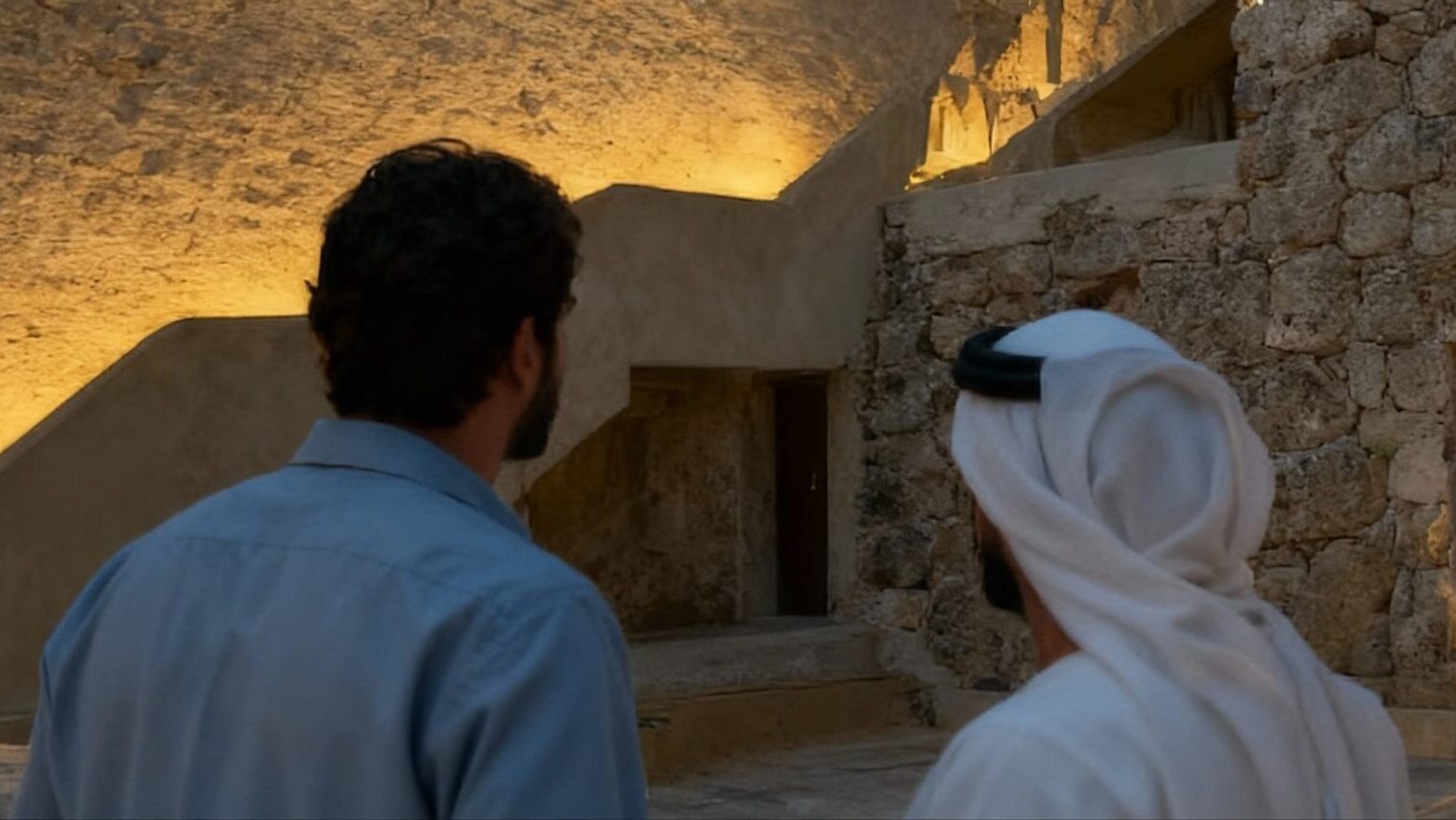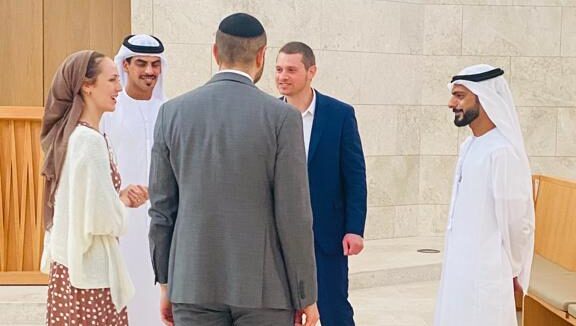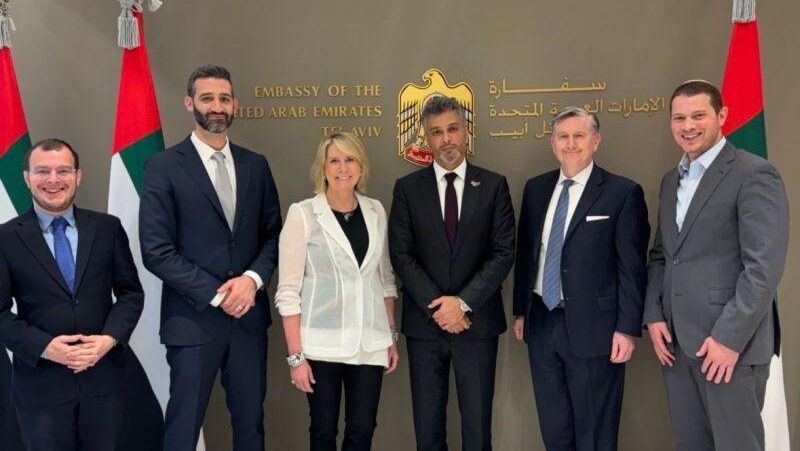Asher Fredman on Abraham Accords’ 5th Anniversary: Continuation Depends on Peace as a ‘Strategic Choice’
Between 2021 and 2024, trade between Israel and Abraham Accords Partners increased by 127%
Five years ago, the White House Lawn was filled with dignitaries from Bahrain, The United Arab Emirates and Israel. The event was a milestone in President Donald Trump’s first administration which culminated in the signing of The Abraham Accords. Following the Biden administration and the longest war in Israel’s history, Asher Fredman, who was directly involved with the Abraham Accords from its inception, spoke to The Media Line about successes, concerns, and provided a forecast for Israel’s relationship with its neighbors.
Asher Fredman, executive director of the Misgav Institute for National Security and visiting fellow at the Heritage Foundation, reflected on The Abraham Accords five years on, the agreements’ landmark accomplishments, their resilience during two years of war, and the challenges and opportunities that lie ahead for Israel and the region.
Fredman emphasized that the accords, brokered by President Donald Trump in 2020, unleashed “an outpouring of cooperation on every level—the diplomatic level, the people-to-people level, the economic level.” He pointed to diverse fields of collaboration, from green hydrogen and precision agriculture to neonatal cardiology, space and satellites, and even women’s rugby. “Literally almost every field imaginable,” he said.
The economic results have been striking. Between 2021 and 2024, trade between Israel and its Abraham Accords partners—as well as Egypt and Jordan, whose ties were strengthened in the wake of the accords—increased by 127%. Nearly 50 intergovernmental agreements have been signed, including a free trade pact with the United Arab Emirates, alongside countless memorandums of understanding and cooperative ventures.
Looking back at the five-year arc, Fredman described “incredible accomplishments as a result of this warm peace.”
Beyond government-level agreements, he stressed the importance of genuine people-to-people ties. He cited the Abrahamic Family House in Abu Dhabi, a synagogue, mosque, and church built to identical dimensions, as “a very pure expression of this idea, this commitment to tolerance, to dialogue.” At the Misgav Institute, Fredman has hosted delegations of young Moroccan entrepreneurs and activists, even after the October 7 war, who came and openly expressed support for Israel.
He acknowledged that delegations from the Gulf have been far fewer since the war, and that in the UAE and Bahrain, especially after the murder of Rabbi Tzvi Kogan, Israelis are more cautious about openly displaying Jewish or Israeli symbols. Still, he insisted that Israelis continue to travel, and “these discussions and these friendships continue.” He recalled founding the Israeli Emirati Forum, the first grassroots initiative to link the two societies, which organized the first Zoom call and WhatsApp group between Israelis and Emiratis.
If we want a better future in the region, we have no choice but to … do the hard work of beginning to rebuild the ties following the war in Gaza
Despite the difficulties of the last two years, Fredman said, “If we want a better future in the region, we have no choice but to rebuild. The ties that have been built in the Abraham Accords hopefully will serve all of us as we do the hard work of beginning to rebuild the ties following the war in Gaza.”
Give the gift of hope
We practice what we preach:
accurate, fearless journalism. But we can't do it alone.
- On the ground in Gaza, Syria, Israel, Egypt, Pakistan, and more
- Our program trained more than 100 journalists
- Calling out fake news and reporting real facts
- On the ground in Gaza, Syria, Israel, Egypt, Pakistan, and more
- Our program trained more than 100 journalists
- Calling out fake news and reporting real facts
Join us.
Support The Media Line. Save democracy.
He praised the UAE for maintaining airline service to Israel throughout the war, calling it significant that “the planes kept flying Israelis to the UAE and back and forth.” At the same time, he noted that Emirati patience has shown limits: summoning Israel’s envoy after strikes in Doha and barring Israel from an air show. “If you had asked on October 7 whether the Abraham Accords would hold through two years of war, tens of thousands of deaths, widespread destruction in Gaza—a lot of people would have said maybe not. Two years later, the answer is that they’ve proven resilience.”
Fredman said trade with Morocco, Egypt, and Jordan continued to rise in the first half of 2025, while trade with Bahrain and the UAE returned to 2023 levels. But public opinion in the region, he admitted, has become “much more negative towards Israel,” shaped by Middle Eastern media that often failed to show the Israeli perspective.
As long as Hamas has the ability to rebuild, then there will never be regional stability
The strike in Doha, he explained, illustrated the different lenses through which Israel and its Gulf partners view stability. Israel believes eliminating Hamas leaders, wherever they are, is essential for lasting peace. “As long as Hamas has the ability to rebuild, then there will never be regional stability,” he said.
But Emiratis see a strike on a fellow Gulf Cooperation Council country as inherently destabilizing. “There’s a gap that needs to be bridged,” Fredman said, adding that some in the region view Israel’s willingness to strike beyond its borders as unrestrained and potentially leading to wider conflict.
Turning to Qatar, Fredman warned that Doha is “deeply insulted and embarrassed that Israel dared to strike on its territory, although it hosts Hamas leaders openly.” He predicted Qatar would use “all of its financial and diplomatic credit and might” to create consequences for Israel. Turkey, which also hosts Hamas leaders, is likewise concerned that Israel could carry out similar operations on its soil.
Fredman noted that the United States, balancing between its alliance with Qatar and its support for Israel’s war aims, has made clear it does not want Israel to repeat such strikes but “is not going to punish Israel for trying to eliminate Hamas leaders.” He said the UAE and Bahrain view peace as a “strategic choice” and will not allow Qatar to derail the accords, though they may take symbolic steps such as limiting overflight rights or excluding Israel from conferences.
Looking beyond current tensions, Fredman pointed to countries that were exploring normalization before October 7, including Indonesia, Mauritania, the Maldives, Comoros, Oman, and particularly Saudi Arabia. He cautioned that negative public opinion, stoked by Al Jazeera and other regional media, poses challenges, but said the “basic interest and logic of cooperation with Israel still remains.”
To restart momentum, he argued for multilateral initiatives such as the India–Middle East–Europe Corridor (IMEC), I2U2, and regional projects in artificial intelligence. The United States, he said, must play a critical role: “Investments in revitalizing the momentum of the Abraham Accords directly serve critical American interests in the region.”
Fredman contrasted the Trump and Biden administrations, crediting Trump for aggressively using incentives and leverage to bring countries into the accords. President Biden, he said, supported the accords diplomatically but was “far less interested in investing” in expanding them. Israel, too, has work to do, such as upgrading its border crossings to be part of future trade corridors.
He urged a strategic effort by Israel and allies to map out roadmaps for strengthening current ties, pursuing new agreements, and linking reconstruction of Gaza to broader cooperation. “There’s no point in a day after if it’s not a day after without Hamas,” Fredman warned.
In that physical structure that connects between the three religions, I think that was a very beautiful expression of where we all want to go
Asked how to address youth hostility toward Israel, Fredman said the alternative to peace is more bloodshed. “We don’t want another October 7th and another devastating war. The only way to get to that is by building these bridges of cooperation and dialogue.” He admitted it will be difficult to persuade young people of the necessity of Israel’s military actions in Gaza, but insisted eliminating Hamas is “an existential need for the country.”
Fredman concluded with personal anecdotes that, for him, captured the spirit of the accords. On his first trip to the UAE, an Emirati stranger welcomed him, invited him to his majlis, and later, as the sun set in the desert, they prayed side by side—Muslims kneeling toward Mecca, him facing Jerusalem. “That was a beautiful moment, which I think really demonstrated the potential of the Abraham Accords,” he said.
He also recalled visiting the Abrahamic Family House with an Emirati friend, standing in the pavilion connecting the three houses of worship as the sun set over Abu Dhabi. “In that physical structure that connects between the three religions, I think that was a very beautiful expression of where we all want to go.”





